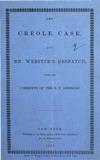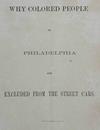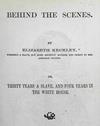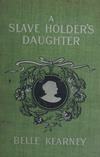Selected Highlights from Afro-Americana Imprints (February 2014)
Spiritualism in the Lincoln White House? Woman suffrage as the key to white supremacy? The February release of Afro-Americana Imprints, 1535-1922: From the Library Company of Philadelphia unearths these and other historical items for scholarly re-examination.
The Creole Case, and Mr. Webster's Despatch; with the Comments of the N.Y. American (1842)

Attributed to William Jay, son of the great jurist John Jay, this imprint explores the implications of one of the most successful slave insurrections in history, achieved with little bloodshed, aboard the Creole. Of the leader of the rebellion, Madison Washington, Jay writes, "The sagacity, bravery and humanity of this man do honor to his name, and, but for his complexion, would excite universal admiration."

United States vs. William Smith. Piracy (1861)
Speech of Hon. William D. Kelley
The schooner Enchantress finds herself in the middle of a Civil War debate between piracy and privateering. William Smith, of the Confederate privateer Jefferson Davis, was tried for piracy in the capture of the Enchantress. Smith planned to sell captured crewmember Jacob Garrick, a free black, into slavery in Charleston, South Carolina.

Interior Causes of the War: The Nation Demonized, and Its President a Spirit-Rapper (1863)
By a Citizen of Ohio
David Quinn, of Ohio, attributes the country's woes to President Lincoln being in thrall to the spiritualists. The White House "rapping table," he says on page 94, "is its law, constitution and gospel; and the great magical power which gathers armies, presages events, equalizes whites and negroes, and converts paper into gold."

Why Colored People in Philadelphia Are Excluded from the Street Cars (1866)
By William Darrah Kelley
Eighty-nine years before Rosa Parks, and a year after the end of the Civil War, U.S. Congressman William Kelley uses the issue of streetcar segregation in Philadelphia to open this critical exploration of the roots of northern racism.

Behind the Scenes. Or, Thirty Years a Slave, and Four Years in the White House (1868)
By Elizabeth Keckley, formerly a slave, but more recently modiste, and friend to Mrs. Abraham Lincoln
Born a slave, Keckley in 1855 purchased freedom for her son and herself. In 1861, she was hired by Mary Todd Lincoln to be her dressmaker and modiste—she dressed Mrs. Lincoln throughout her time in the White House. Their relationship lasted for many years afterward, despite the controversy caused by this book.

A Slave Holder's Daughter (1900)
By Belle Kearney
Born to an aristocratic family that suffered penury after the Civil War, Kearney educated herself, becoming an ardent supporter of temperance and woman suffrage, and eventually, Mississippi's first woman state senator. Her support for women's voting rights had a jarring twist: in her view, it would bring about "immediate and durable white supremacy, honestly attained."
For more information about Afro-Americana Imprints, 1535-1922, or to request a trial for your institution, please contact readexmarketing@readex.com.



